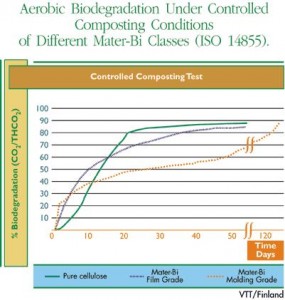- Other Country Restrictions
- What is MATER-BI
- Benefits of SuperBags compared with HDPE and other “Degradable” bags
- Durability of SuperBag
- Composting Process
- The Cost of HDPE, Paper and Natureworks SuperBags
- Government and Industry Initiatives
- Natureworks Packaging Overseas
Things that other countries/states are doing about plastic bags
*Denmark, a tax on shopping bags was introduced in 1994.
*Finland, supermarkets pay a levy on the number of plastic bags used.
*Hong Kong prohibits retailers over a specified size from providing plastic bags free of charge.
*South Africa banned thin plastic bags in 2003 and put a tax on thicker plastic bags.
*Botswana banned thin plastic bags in 2007.
*Egypt. The Red Sea (Hurghada) is the first plastic bag free governorate in Egypt having introduced a
ban in 2009.
*Ethiopia in 2008 banned the manufacture and importation of thin plastic bags.
*Eritrea In 2005, the Government banned plastic bags.
*Ghana. The Government required plastics producers to contribute to the labour costs associated with
collecting plastic bag litter for recycling.
*Kenya. In 2008, the Government instituted a ban on thin plastic bags.
*Rwanda. The importation and use of plastic bags was banned in 2006.
*Somalia. The autonomous region of Somaliland within Somalia banned plastic bags in 2005.
*South Africa. A ban was introduced in 2003 .
*Tanzania. In 2006, Tanzania banned plastic bags.
*Uganda.
*Bangladesh
*Bhutan. The Government first introduced a plastic bag ban in 1999.
*China. From January 2008, the Chinese Government placed a ban on the production, distribution
and use of HDPE plastic bags.
*Taiwan, a ban on the free distribution of plastic bags was instituted in 2001.
*India. In India, a number of cities have taken action to reduce reliance on plastic bags.
The Bombay (Mumbai) city council banned plastic bags in 2000.
In Chandigarh, polyethylene plastic bags were banned in 2008.
From January 2009, shops, five star hotels, restaurants and green grocers in New Delhi were
banned from distributing plastic bags
*Malaysia. Businesses within parts of Malaysia have joined with the Energy, Green Technology and
Water Ministry to minimise plastic bag use from late 2009.
*Myanmar. A series of bans were instituted in Myanmar in 2009 including in the cities of Mandalay,
Bagan and Nay Pyi Taw.
*New Zealand. A number of retail outlets introduced levies on plastic bags in 2009 as a result of community.
*Thailand. In December 2009 a memorandum of understanding was signed between most of the
Phuket’s major retailers agreeing to place a levy on plastic bags.
*Belgium. From June 2007, the Belgian Government commenced a progressive tax on retailers’ use of
plastic bags.
*France. In 1999, the French island of Corsica banned plastic bags. In 2007, the city of Paris banned
non-biodegradable plastic bags in large stores.
*Germany. Whilst the Government has not initiated any economic measures to reduce production or
consumption of plastic bags, most grocery stores charge consumers up to 25 euro cents per
bag to cover supply.
*Israel instituted a levy on plastic bags in 2008.
*Italy. In 1989 the Italian Government introduced a tax on the production and importation of plastic
bags.
*Macedonia.The free distribution of plastic bags was banned in Macedonia in 2009.
*Norway. Whilst the Government has not initiated any economic measures to reduce production or
consumption of plastic bags, most grocery stores charge consumers to cover supply costs.
*Republic of Ireland. The Republic of Ireland was the first nation to tax plastic shopping bags
*Spain. Whilst the Government has not initiated any economic measures to reduce production or
consumption of plastic bags, most grocery stores charge consumers to cover supply costs.
*Sweden. Whilst the Government has not initiated any economic measures to reduce production or
consumption of plastic bags, most grocery stores charge consumers to cover supply costs.
*Switzerland. A ban was proposed on plastic bags in 2009.
*United Kingdom. There is no legislation banning plastic bags as yet the UK held its first Plastic Bag Free Day in 2009 drawing inspiration from the 14-odd towns that have banned plastic bags locally.
In 2009, the Welsh Assembly Government announced legislation requiring retailers to charge
for all plastic bags from the beginning of 2011.
*United Arab Emirates. The first emirate of Ajman enforced a ban on plastic bags from July 2010.
Abu Dhabi banned plastic bags from January 2010. This is part of a plan to ban all non-biodegradable
plastic bags in the nation by 2013. Biodegradable plastic bags will be permitted.
*Argentina. The province of Buenos Aires placed a ban on non-biodegradable plastic bags in 2008.
and El Bolson have also enacted bans with a 2 year period prior to enforcement.
*Canada. In 2009, the city of Toronto introduced a bylaw instructing retail outlets to charge a levy on
plastic bags, at a minimum of 5 cents per plastic bag.
In 2007, the town of Leaf Rapids in Manitoba became the first Canadian town to ban plastic
bags following from a levy imposed a year earlier.
The small town of Huntingdon in Quebec banned plastic bags in 2008.
The Indigenous community of Nain instituted a ban in late 2009.
*Mexico. Mexico city made the decision to ban non-biodegradable plastic bags in 2010.
*Uruguay. A 2007 ordinance requires retailers to develop waste management plans which must
incorporate actions to reduce plastic bag use.
*USA. City councils; Impetus for action to curb plastic bag consumption has emerged at the
grassroots community level and is reflected by the large number of city councils who have
enacted plastic bag bans or taxes.
In 2007, the city of San Francisco became the first to enact a ban, followed by Oakland, Westport Connecticut, and Fairbanks North Star Borough in Alaska.
The city of Los Angeles has instituted a ban on plastic bags from July 2010 with paper and
biodegradable plastic bags attracting a levy.
Malibu city in California banned all non-reusable plastic bags in 2008. Kauai county in Hawaii
has banned non-degradable plastic bags and Maui county also in Hawaii has introduced a ban in 2011.
Bills have been proposed to reduce plastic bag use through bans, levies or other measures in
the states of Missouri, Nevada, New Hampshire and New Jersey and Massachusetts.
In Washington DC, a tax of 5 cents per bag will be levied upon consumers receiving plastic
bags at grocery, convenience and drug stores from 2010.
Town level
In addition to measures implemented by city councils and retailers, a number of towns in the
USA have declared bans on the plastic bag. This includes some 30 towns in Alaska.
South Australia and Victoria
South Australia;
There are various documents produced for the South Australian Government;
*Plastic Shopping bags (Waste Avoidance) Act 2008
*ACCC on advertising. Biodegradable, degradable and recyclable claims on Plastic bags
*The Environmental and Heritage Council report 2006-7 consumption on Plastic Retail carry bag use
*KPMG trial of a government and industry charge on plastic bags
Victoria;
This is a report on a trial held in Victoria in August 2008.
*Trial of a Charge on Plastic Bags: Report of the Steering Committee to The Victorian Minister for environment and Climate change and the Australian National Retailers Association 29 October, 2008.
Conclusions
Both states held a trial on the charging of a levy for plastic bags to determine if the public would be prepared to pay a levy for using single use shopping bags and/or change habits and use alternative carry bags. The result was that a levy would reduce plastic bag use for a period of time but not necessarily change people’s shopping habits.
South Australia has since the 4th May 2009 banned the use of single use shopping bags. This has had the effect, due to the legislation (to be reviewed shortly and strengthened), to circumvent the ban by; Retailers providing plastic bags with printing stating that the same bags are “recyclable”.
People buying bin liners as shopping bags.
People and retailers angry at the lack of viable alternatives that do not affect lifestyle and shopping habits.
The government intends to strengthen the legislation to negate the use of plastic shopping bags that do not comply by instigating a certification process that will require the bag to be approved before use. The use of compostable and biodegradable on packaging will be scrutinized at state level for approval for use, bringing proper adherence to the policy into play.
What is Mater-Bi
Product information including the source of the raw material, place of production and a basic outline of the production process;
Naturally biodegradable and compostable
Mater-Bi is an innovative family of bioplastics that uses substances obtained from plants, such as vegetable starch, and biodegradable polymers obtained both from renewable raw materials and fossil raw materials. Developed by Novamont Italy (Working Partners in Natureworks Packaging Australia) Mater-Bi comes in granular form and can be processed using the most common transformation techniques for plastics. It can be used to create products whose characteristics are similar to or even better than those of traditional plastics, but which are perfectly biodegradable and compostable. The different forms of Mater-Bi are known as ‘grades’ and each one is identified by a different code.
In the grades containing starch, the starch is “complexed” with variable quantities of biodegradable polymeric complexing agents to create a variety of molecular superstructures with a wide range of properties that can be put to many different uses.
In the broad Mater-Bi family, the most recent ‘second generation’ grades arose out of research into raw materials obtained from vegetable oils. This new product range presents synergies with the already consolidated technology of starch processing. This is the product that Natureworks uses for its Superbag.
All Mater-Bi products are biodegradable through composting. Some can be composted under the harsher conditions of domestic composting, while others biodegrade in the soil. Natureworks Superbags are certified domestically compostable.
As versatile as plastic.
There are numerous applications and areas in which Mater-Bi can be used. Examples include agricultural applications (mulching film, twine), catering (plates, cutlery, cups, and trays), packaging (fresh fruit and vegetables, muesli, bakery products), accessories, toys and biofiller for the automotive sector.
Novamont is currently involved in the Bio-refinery Project which aims to strictly integrate a zero waste farming activity with the production of raw materials needed for bioplastics production. With official EEC (the VI Framework Program) support Mater-bi is able to use agricultural waste rather than food or feed crops to produce bioplastic which is in itself a huge step towards increased sustainability
Benefits of SuperBags compared with HDPE and other “degradable” bags;
Many companies are offering “degradable” or “compostable” bags. These are essentially HDPE in nature, or made with calcium carbonate with a coating (d2w which is another petroleum product) that requires exposure on both sides to UV and industrial composting in order to break down. The end result is these products only break the plastic down into smaller particles that contaminate the compost, soil and ocean.
Councils here and the USA will not compost these bags for that reason. European standards are changing to be even stricter on what can be considered biodegradable. Our product will be one of the few that can pass the test.
Natureworks SuperBag can be burnt without producing any emissions or poisonous gas into the air (other than the stored carbon within).
Superbag material breathes so moisture can escape but not bacteria so there is no smell when tied with wet organic waste (ie kitchen waste).
Plastics are made from non-renewable natural resources such as crude oil, gas and coal.
Assessment of HDPE plastic Bag manufacture indicates that production of 1000 bags produces 12.2 kg CO2 and requires 420MJ in energy. According to the 2002 Nolan ITU Report for Environment Australia on Plastic Shopping Bags – Analysis of Levies and Environmental Impacts; just 8.7 plastic checkout bags contain enough embodied petroleum energy to drive a car 1 kilometre. With 3.93 billion bags (plus produce bags) currently being used in Australia annually, this equates to equivalent of 54 million litres of crude oil consumption.
Mater-Bi can be used with ANY waste disposal system
Waste disposal is a problem for society and products should be designed with at least one disposal option in mind. In general, the greater the number of “end of life” scenarios, the greater the possibility that one of these options will be adopted. As well as traditional forms of recovery, Mater-Bi has an additional option: organic recovery, namely the possibility of being recovered through composting. All disposal options currently available can therefore be applied to Mater-Bi products: energy recovery, recycling and the disposal of the organic element are interchangeable, depending on the waste collection system in use in the area in question and the waste processing technology used locally.
Mater-Bi can be used to make products that comply with the essential requirements of the EU Directive on packaging and packaging waste (94/62/EC) and that satisfy the respective harmonised European standards: EN 13430 (recycling), EN 13431 (energy recovery) and EN 13432 (organic recovery) and the stricter Australian certification AS 4736 which incorporates “the Worm test”.
Natureworks SuperBags and products are home compostable;
Home compostability is different from industrial compostability for two main reasons:
1) the temperatures reached by the waste inside the home composting bin are usually only a few centigrade degrees higher than the outside temperature, and this is true for short time periods (in industrial composting, the temperatures reach 50°C – with peaks of 60-70°C – for a number of months);
2) home composting bins are not comercially managed and the composting conditions might not always be ideal (in contrast, industrial composting plants are managed by qualified personnel, and kept under ideal working conditions). The grades of Mater-Bi used for Natureworks products are certified as “home compostable”, as they biodegrade at the temperature of the environment and in a home composting bin.
Mater-Bi uses Alternative Raw Materials and Energy Sources
In the long term our society needs to substitute raw materials based on fossils (petroleum) with raw materials from renewable sources. Oil is a limited resource, the cost of which is rising due to increased global demand.
Mater-Bi is the result of continuous efforts to use new technologies and new industrial supply chains based on the use of renewable energy and raw materials, while ensuring the highest levels of performance.
The use of renewable raw materials instead of those derived from fossils in the chemical and plastics industry can help control greenhouse gases, as these materials use atmospheric CO2 absorbed by plants through photosynthesis.
Mater-Bi and Soil Fertility
Mater-Bi can help improve the process of composting: the fact that it can be composted makes it easy to separate waste collection (organic waste together with Mater-Bi products) for organic recovery. In particular, Natureworks SuperBags, which can be composted together with organic waste, enables organic recycling of mixed waste, since both parts (objects made from Mater-Bi and food waste) are biodegradable and compostable. Separate collection and recycling of organic waste in compost is highly advantageous for the environment as compost traps carbon in the soil and maintains its fertility.
Every year 52 million tonnes of organic waste is produced in Europe (kitchen waste, food scraps, and garden waste). Waste incineration immediately releases greenhouses gases into the environment, while dumping in landfill releases methane (a powerful greenhouse gas). In contrast organic composting restores organic substances to the soil, with substantial reductions of CO2 emissions.
If mater-bi is accidentally swallowed by a person or an animal;
Mater-Bi is not toxic. Studies on dogs, cows and mice confirm there is no harmful effects of swallowing the mater-bi. This was compared with traditional polyethylene films in order to check their effect on animal digestion. Mater-Bi can degrade under conditions that simulate the digestive system of animals (such as turtles), while polyethylene films cannot.
Durability of the SuperBag
The Superbag is rated to hold 8kg (Stores limit weight to 4kg – 2x 2 litre milk containers)
Depending on conditions the SuperBag may start to break down after 12 months when in storage. Storage around 23 C and 50% moisture is recommended. We have determined that by wraping bulk product in either HDPE or mater-bi the useful life can be extended to over 2 years.
How the composting process happens
The following graphs and photos show the degradation and time frame of Mater-bi when exposed to composting, coastal zones and salt water (ocean).
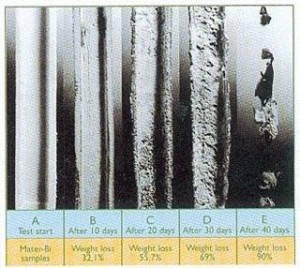
The time frame for degradation in composting of Mater-bi
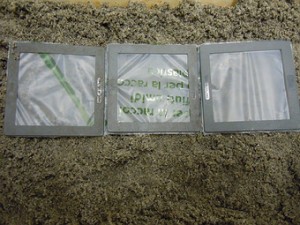
Figure 1. Samples of different films are inserted in slide frameworks and exposed to the wet sediment
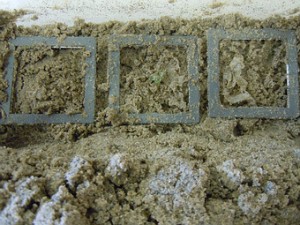
Figure 2. After 92 days of treatment material is disintegrated
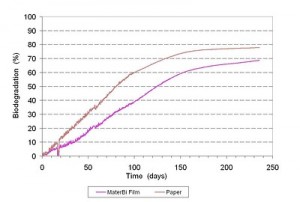
Figure 3. Biodegradation curves of a film-grade Mater-Bi film and a filter paper (laboratory grade) measured as oxygen consumption with an oxytop equipment
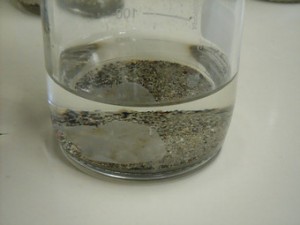
Figure 4. Sample appearance at a biodegradation level of 50% in sea water. (2months)
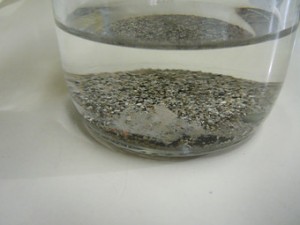
Figure 5. Sample appearance at a biodegradation level of 65% in sea water. (3months)
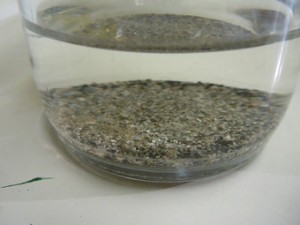
Figure 6. Sample appearance at a biodegradation level of 92% in sea water. (9months)
The results shown are preliminary and the research is ongoing. The complete study will be released in a scientific paper.
The cost of HDPE, Paper and Natureworks SuperBag;
Plastic Bags
HDPE bags are currently sold to retailers for 2-4c each +gst.
The life of HDPE bags; Under perfect conditions a bag takes a thousand years to biodegrade, and in a landfill, plastic bags decompose even slower. If buried, they block the natural flow of oxygen and water through the soil. If burned, they release dangerous toxins and carcinogens into the air. The damage is even more severe when the bags end up in the ocean where marine life dies each year after mistaking plastic bags for food. Plastic photo-degrades which means over time the plastic breaks down into fragments. These fragments absorb heavy metals, chemicals and poisons and as small fish, birds and animals eat and swallow them intentionally or inadvertently these chemical concentrations end up in the food chain.
Why recycling is not viable: It costs more to recycle a plastic bag than to produce a new one. The industry cost of 1 ton of plastic from a manufacturer is $32, while 1 ton of plastic bags costs $4000 to recycle! Compounding the problem with HDPE bags is the fact that, not only do we make tons of plastic bags (and use lots of oil in the process) we only recycle 2 percent.
80% of plastic bags get used as bin liners but the issue is they then become landfill anyway and cause the kitchen waste inside them to become toxic as there is no bacterial activity when buried intact.
Paper bags
The Paper bag equivalent is sold to retailers for 18c each +gst.
*Paper bags cost more in energy and pollution to produce than HDPE bags.
*Paper bags use 40% more energy to produce and generate 80% more solid waste than plastic (HDPE) bags.
*Paper bags generate 70% more emissions, and 50 times more water pollutants than
plastic bags.
*Paper bags made from 100% recycled fiber use more fossil fuels than plastic bags
*To produce 1 tonne of paper requires 13 trees, 2.5 barrels of oil, 4100KWH of electricity and 31,780 litres of water.
The SuperBag
The Natureworks SuperBag is sold to retailers for 12c each +gst.
The Energy Balance of Superbags;
The specific electricity consumption for CF05S granule production (i.e. core processes) is approximately 0,32 kWh per kg or around 40 kWh per 1000 Natureworks Superbags
About 15.7 kilograms of renewable ingredients are used to produce 1000 Natureworks SuperBags.
The atmospheric CO2 uptake during plant growth and temporarily held in 1000 bags of Natureworks SuperBags is
approximately 1.07 kg.
Life Cycle Analysis shows that the energy cost of producing Superbags is lower than that of traditional plastic bags.
The Natureworks Superbags made from Mater-bi have been tested in composting pilot projects in Germany, Canada and Australia. In all cases the composting plant operators could confirm the complete decomposition of the Superbags in their facilities. If the organic waste were to be collected and composted separately in all of Europe, the greenhouse gas emissions from waste disposal could be reduced by around 30 percent. If the same occurred in Australia the percentage reduction would be even higher due to our higher consumption.
Government and Industry Initiatives
The Australian Retailers Association, which represents major supermarkets such as Coles, Woolworths, Franklins and IGA, has encouraged its members to commit to a code of practice to voluntarily reduce plastic bag use to protect businesses from “the damaging effects of a levy or ban”.
Chief executive Stan Moore says politicians are responding to a “populist view” in their approach to plastic bags. Nevertheless, he says, major retailers are on track to meet the 25 per cent target, although he admits small retailers are lagging behind.
In Moore’s opinion, a ban would result in a “consumer revolt” because people would be left with no suitable alternative to the plastic bag, and a levy would place an unacceptable burden on small retailers. What’s needed, he argues, is “sound science” to come up with an alternative to the plastic bag.
John Dee, the founder of Planet Ark, says the Government is relying too heavily on the major supermarket chains to bring about change across the board in the retail sector.
The big supermarkets distribute only about half of all plastic bags used in Australia, while the remainder are given away by corner shops, fast food outlets and other small retailers.
He says the smaller retailers are doing little to curb plastic bag use, so there is “very little chance” of achieving a 25 per cent reduction among all retailers.
Despite his pessimism, he says consumers are becoming increasingly aware of the impact of plastic bags on the environment and the fact that they cost retailers $173 million a year, a cost that is passed on to consumers.
Dee says even companies that manage landfills are sick of plastic bags.
“Most landfill managers I have spoken to have said plastic bags are the single worst problem they have to cope with in landfill. They hate them with a passion.”
On a windy day, up to 25,000 plastic bags can be blown off landfills. One NSW landfill management company employs between two to four people at each landfill site just to stop plastic bags blowing away, Dee says. So what is the solution to the plastic bag problem in Australia? The Natureworks SuperBag. 100% compostable domestically and commercially AND naturally biodegradable.
Natureworks Packaging Overseas
Natureworks through its U.S. partner is currently trialing Superbags through The Retail Council of Canada, the Canadian Grocery Distributors, the Canadian Federation of Independent Grocers and the Canadian Association of Chain Drug Stores.
Natureworks Packaging is currently negotiating contracts to supply major grocery chains in the Middle East, Asia and Europe as well as community conscious councils in Australia.

